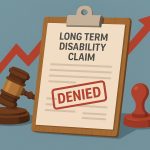Accidents come in different magnitudes regarding property damage and personal injuries suffered by involved parties. In Texas, where busy highways and dense traffic contribute to thousands of accidents annually, understanding your legal position becomes crucial for protecting your interests. Irrespective of the severity of the outcomes in an accident, you may need to pursue compensation for damages suffered in an accident where the other party was negligent in their conduct leading up to an accident.
As highlighted in this guide, the compensation recovery journey begins with understanding your rights and responsibilities. Keep reading to learn more, and consider consulting with an experienced personal injury attorney to fully understand your legal options after an accident.
Your Right to Compensation
Texas is a fault-based state where the accident victim recovers compensation from the at-fault party and, in most cases, from the at-fault insurer. But you have to prove negligence on the part of the at-fault party.
Under personal injury law, negligence is a failure to exercise reasonable care, causing harm to another person. For example, a tailgating driver who rear-ends another one can be said to have not acted with reasonable care and thus be negligent.
Texas is a comparative negligence state. So, as a victim in an accident, your contribution to causing the accident will impact your recovery. For example, if you are deemed 40 percent at fault, you will only be entitled to recover 60 percent of the awarded damages.
Your Responsibilities
While you may have a right to compensation, it is not automatic; you may have to fight for it. Here are some critical steps to take following an accident to improve the outcomes:
Seek Medical Attention
“It is challenging to recover damages from an accident if you do not have medical records to back your claims. You also may have a problem if the available medical records indicate a treatment gap,” says personal injury attorney Max Paderewski of Lone Star Injury Attorneys, PLLC.
So it’s best to always seek immediate medical attention, preferably by having paramedics come to the scene by calling 911. If you do not get checked while at the scene, visit the ER on the same day or not later than 72 hours following the accident.
Document Everything and Preserve the Evidence
You must have evidence to back your claims to succeed with your personal injuryclaim. Medical records are critical evidence, so ensure you preserve every document, from the bills, receipts, invoices, and doctor’s notes.
Scene evidence is also critical, so do not leave the scene without it unless it’s impossible for you due to your injuries. According to the National Highway Traffic Safety Administration, proper documentation at the accident scene significantly improves the success rate of insurance claims and legal proceedings. Take pictures, record video footage, talk to witnesses recording their accounts, and get their contact information.
Collect another party’s insurance, vehicle registration, and contact information. A lawyer can help you gather evidence that requires strict legal procedures to procure, such as CCTV footage.
File a Police Report
If the police do not come to the scene, ensure you file a report. Texas law requires the filing of a police report if an injury results in injuries, death, or significant property damage. The police report also acts as the official report. It makes a big difference in the strength of your case, so file a report irrespective of the accident’s severity because you may never know what will come out of it later.
Protecting Your Rights
The defendant’s side doesn’t care much about your rights, but they could pretend they do to win your trust and ultimately get the upper hand in a case’s outcome. Having a lawyer in your case is the best way to protect your rights and put you on par with the opposing side. While it will mean paying legal fees, you stand to recover more with a lawyer than without one, even when considering legal fees.
Lynn Martelli is an editor at Readability. She received her MFA in Creative Writing from Antioch University and has worked as an editor for over 10 years. Lynn has edited a wide variety of books, including fiction, non-fiction, memoirs, and more. In her free time, Lynn enjoys reading, writing, and spending time with her family and friends.















